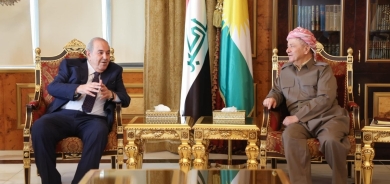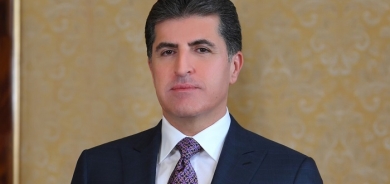Anthony Cordesman: There is a responsibility that nations have for taking care of themselves and Iraq in many ways does not have the political leadership that shows that responsibility
August 21, 2014
Exclusive Interviews

Cordesman: I think people in Iraq have to understand that people have not done nothing but we have waited, now, for Iraq to show enough national unity and enough willingness to deal with its Sunni population to think sometimes the intervention meaningful. The problem that we have faced is not simply the ISIS, it is the internal positions in Iraq. Its government that created a condition made the invasion of ISIS possible. And it is a corruption witnessed in the Iraqi security forces for they have a clear picture that supporting Iraq will put some kind of change in useful resources. This is not a case where people in Iraq in somehow resume to the outside than their home…
Gulan: how do you see current Maliki’s policy towards the circumstances that Iraq is passing through?
Cordesman: I think that the Maliki government has failed to meet the needs of Iraqi people, he is not tried to create the level of unity that Iraq desperately needs and must have to give a kind of international support that it wants. The problems with the KRG that Maliki created with the Sunnis are remarkably dangerous and may help survive the civil war in Iraq in a time when he should have allowed Iraq toward development. Whether a new government can be formed that will have more credibility in terms of national unity is still something that all of us are waiting to find out.
Gulan: we have heard that the United States has agreed to supply Peshmerga with heavy weaponry, but we are not sure whether it is true or not, so why don’t you give Peshmerga weapons to fight terrorism?
Cordesman: I think the people have to understand that the United States is not going to provide weapons to one part of Iraq which can be used against other parts. That is one of the reasons that not giving the Maliki government weapons… it is a key factor that again people in Iraq are going to have to think out because the key issue now is whether there is going to be in Iraqi national government that seems to be unified and effective so it can attain its national support.
Gulan: KRG shares 1050 kilometers with Iraq which most of them now is under isis control. This means Iraq is divided into three different countries so it seems impossible for Iraq to return back before June, hence why does not the west support Kurdish independency?
Cordesman: let me repeat that the United States is very, very reluctant to support Iraq which remains as divided and weak as it is today. It is not going to seek Kurdish independence under the current circumstances or to endorse it, it is not going to support the idea that Iraq should be divided. These are realities which are sufficiently divisive and dangerous in the region. So people have to understand in Iraq that there is no magic sources from outside aids if Iraq do not move towards some degree of unity that doesn’t mean rolling back what happened in Mosul, but it does mean that there has to be a real convincing effort at creating the Iraqi government that unites the Kurds, the Shiites, and the Sunnis and I think the level of the US and outside assistance is going to depend very heavily of that background. If things reach to the point where there is a true crisis, the situation may change, but it is also a fact that we all talk about ISIS, we talk about a movement which took Mousl and a good part of Iraq by ten thousand fighters. You have to put that in perspective when people make calls for USA.
Gulan: Recently out of ISIS attack to Shingal, thousands of Yazidis have been displaced and killed as they have refused to convert into Islam. Why do you think international community chose to be silent towards mass murdering of a nation in the 21st century?
Cordesman: let me go back again: first the international community is a name does not exist as an organized body, United States has the issue of military assistance, but I think you have to understand that Iraq is one of many areas which preserve crisis in today’s world, and for the United States to become deeply involved, Iraq has to show that at least at the political level it is moving to unity and not aid would be affective, if it will not involve eventually supporting the division of Iraq for a civil war. That put intense pressure on both Kurdish and Shiite communities in Iraq as well as the Sunnis who oppose the strikes of ISIS, those are the realities that people face the Iraqis will see the United States stand aside indefinitely, we have been through this once before, and the Iraqis have to show clearly that at least they are making the beginning towards some kind of effective structure of governance and unity that it is worth supporting.
Gulan: are Kurds alone in this war?
Cordesman: I think the answer is going to depend a great deal on whether Iraq can produce a national government. It seems to be two thirds away there, there is great reluctance on the part of the United States to intervene as long as on the one hand you have a government that is not for one for Maliki is trying to stay in power and on the other hand we are watching a return to sectarianism… these are issues that Iraq has to come to grips with internally, if you are expecting that in today’s world with many continuing conflicts that there will be somehow automatic support, a lot of people in the United States are lobbing for this. I think you need to be very, very careful, the first step here is Iraqi unity, its creating a government, its showing that this government is determined to bring together all of the elements of Iraq.
Gulan: if Maliki remains as it is now, to what extend do you think the international anti-terrorism alliance will support Peshmerag?
Cordesman: I think it depends on what happens in the next two or three weeks. If there is no real prospect of the Iraqi unity, then the United States and the countries that really care and who are willing to support what happens in Iraq are going to make them very, very hard decisions about whether to try to support either the Kurdish arms forces or some kind of Shiite structure and go further than they have already providing military assistance and let me say that I don’t know how the administration deals with what happens in the past few days, it may come their minds to some degree in supporting the Kurdish Peshmerga. But again, these are not things where you can simply say that we have a problem that we face a threat and expect support. There is a responsibility that nations have for taking care of themselves and Iraq in many ways does not have the political leadership that shows that responsibility.
I think that the key test now is if the efforts in Baghdad make any kind of rapid progress towards providing a capable, consistent government where the Kurdish, Sunni, and Shiites, political leaders that support Iraqi Unity and democracy, show that they have a real capability to govern, the alternative quite frankly is that even if you have military assistance, I will look north and consider ongoing problems in Turkey, look at Syria, and look at Iran and consider really what Kurdish independence might mean in the real world!















